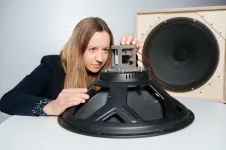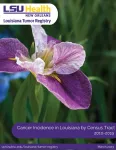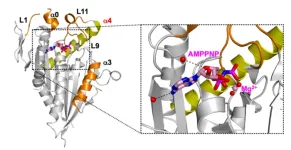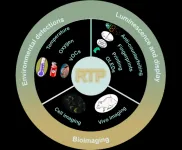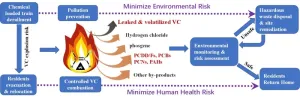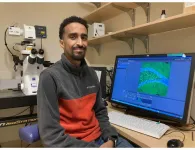Philadelphia, April 3, 2023—In a significant step for the treatment of neuroblastoma, an international group of researchers led by Children’s Hospital of Philadelphia (CHOP), Winship Cancer Institute of Emory University and the New Approaches to Neuroblastoma Therapy (NANT) Consortium has shown that the targeted therapy lorlatinib is safe and effective in treating high-risk neuroblastoma. The findings, published today in Nature Medicine, have led to a major amendment in a phase 3 Children’s Oncology Group (COG) clinical trial, which has incorporated lorlatinib for newly diagnosed ALK-driven high-risk neuroblastoma, as well as a planned amendment to the European phase 3 trial in collaboration with the International Society of Paediatric Oncology European Neuroblastoma (SIOPEN).
“The results of this study are exciting for patients with high-risk neuroblastoma whose tumors have a genetic alteration in the ALK gene and who have lacked effective targeted treatment options for this often lethal cancer,” said senior study author Yael P. Mossé, MD, Professor of Pediatrics in the Cancer Center at Children’s Hospital of Philadelphia (CHOP). “This study is the culmination of decades of work that began at CHOP with our initial discovery of ALK mutations in neuroblastoma in 2008. The difficulties we experienced in targeting ALK with crizotinib in neuroblastoma motivated us to find a more potent ALK inhibitor. We started testing lorlatinib in the lab in 2013 and, as a result of this clinical trial, lorlatinib has now moved upfront in a pivotal COG phase 3 trial, which will hopefully support eventual FDA approval of this treatment. This serves as a paramount example across all pediatric cancers of forward and reverse translation, where we learn from the science and from our patients and make decisions in real-time to fast-track development of new agents when there is potential for substantive impact.”
“The profound clinical responses seen in this trial, in a highly therapy-resistant, relapsed pediatric cancer population, allows us to now offer lorlatinib into frontline care for newly diagnosed patients with ALK mutated or amplified neuroblastoma, a population known to have inferior survival with standard-of-care, high-risk therapy,” said the study’s first author and co-chair of the trial Kelly Goldsmith, MD, Co-Leader of the Discovery & Developmental Therapeutics Program at Winship Cancer Institute of Emory University, Director of the Neuroblastoma/MIBG Therapy Program at the Aflac Cancer and Blood Disorders Center of Children’s Healthcare of Atlanta and associate professor of pediatrics at Emory University School of Medicine. “This trial will truly change the paradigm of clinical care and improve outcomes for our neuroblastoma patients.”
Neuroblastoma is an aggressive pediatric cancer that develops from early nerve cells, often appearing as a solid tumor in the chest or abdomen. The disease accounts for up to 10% of childhood cancer deaths, and survival rates are low – less than 50% of patients with the disease survive, and there is still no known curative therapy for patients who suffer a relapse, despite recent improvements in our understanding of this disease and the development of new treatment options. A notoriously challenging disease to cure, neuroblastoma is characterized by a variety of types and subtypes caused by separate and interacting gene mutations, which only adds to the complexity in devising rational and effective therapies.
A Crucial Discovery
In 2008, Dr. Mossé and colleagues discovered that the anaplastic lymphoma kinase (ALK) gene causes most cases of rare, inherited neuroblastoma. Since then, she and colleagues from around the world have investigated how mutations in the ALK gene lead to different types of nonhereditary neuroblastoma. Subsequent research has showed that abnormal ALK changes drive approximately 20% of newly diagnosed high-risk neuroblastoma and that this frequency is substantially higher among relapsed patients.
Based on Dr. Mossé’s discovery, in 2009 COG launched a clinical trial for children with neuroblastoma that repurposed crizotinib, an ALK inhibitor that was already approved by the FDA to treat adults with a subtype of lung cancer caused by abnormalities in the ALK gene. This pivotal phase 1/2 trial led to the FDA approval of crizotinib for pediatric patients with relapsed/refractory ALK+ anaplastic large cell lymphoma and for pediatric patients with ALK+ unresectable/relapsed inflammatory myofibroblastic tumors.
Next-Generation Treatment
However, although crizotinib demonstrated impressive response rates in other ALK-driven cancers, data from the phase 2 COG trial showed that children with neuroblastoma had a response rate of only about 15%, underscoring the need for a next-generation ALK inhibitor that would be more effective.
After screening numerous anti-ALK agents, the researchers discovered in preclinical tests that lorlatinib, an ALK and ROS-1 inhibitor, surpassed results seen with crizotinib. Leveraging that data, the researchers were able to test the safety, tolerability, and anti-tumor activity of lorlatinib in a first-in-child NANT Consortium Phase 1 trial in children, adolescents and adults with ALK-driven refractory/relapsed neuroblastoma.
New Approaches Show Promise
In the phase 1 NANT trial, researchers found that lorlatinib given alone or in combination with chemotherapy was safe and tolerable in pediatric, adolescent, and adult patients with relapsed/refractory ALK-driven neuroblastoma. Lorlatinib demonstrated clinical activity across patients of all ages harboring the three neuroblastoma-specific hotspot ALK mutations, including patients who had previously received other ALK inhibitors.
Approximately 30% of patients under the age of 18 responded to the drug, and approximately 67% of patients over 18 responded. Patients under the age of 18 had a better response in combination with chemotherapy, with 63% of patients responding to the combined treatment. The researchers noted that younger patients treated with lorlatinib alone – particularly those with amplification of an oncogene called MYCN – had fewer responses compared to older patients. They suspect this could reflect the heterogeneity within the tumor in these patients and indicate that for patients with MYCN mutations, lorlatinib alone will be insufficient, but holds promise when given in combination with chemotherapy. Swiftly moving this drug upfront for the subset of patients with ALK alterations provides an opportunity to go after a key driver of this disease to prevent relapse.
The safety profile of lorlatinib across all ages was similar in scope and grade to those reported in studies examining lorlatinib in non-small cell lung cancer. The neuroblastoma patients using lorlatinib also experienced weight gain and increased circulating lipids, but those were manageable with supportive care and diet management.
In addition to the NANT sites in the U.S. and Canada, the study also included sites in the U.K. and France.
The trial was funded by the National Cancer Institute (grant P01CA217959) and Pfizer, Inc. Additional support came from NCI grants R01CA140198 and R35CA220500, as well as Solving Kids Cancer US/UK, the St. Baldrick's Foundation, V Foundation for Cancer Research, Alex’s Lemonade Stand Foundation, Children’s Neuroblastoma Cancer Foundation, The Band of Parents, the EVAN Foundation, Wade’s Army, Ronan Thompson Foundation, the Catherine Elizabeth Blair Memorial Foundation, and Cookies for Kids Cancer.
Goldsmith et al. “Lorlatinib with or without chemotherapy in ALK-driven refractory/relapsed neuroblastoma: phase I trial results,” Nature Medicine, April 3, 2023, DOI: 10.1038/s41591-023-02297-5
#
About Children’s Hospital of Philadelphia: A non-profit, charitable organization, Children’s Hospital of Philadelphia was founded in 1855 as the nation’s first pediatric hospital. Through its long-standing commitment to providing exceptional patient care, training new generations of pediatric healthcare professionals, and pioneering major research initiatives, the 595-bed hospital has fostered many discoveries that have benefited children worldwide. Its pediatric research program is among the largest in the country. The institution has a well-established history of providing advanced pediatric care close to home through its CHOP Care Network, which includes more than 50 primary care practices, specialty care and surgical centers, urgent care centers, and community hospital alliances throughout Pennsylvania and New Jersey, as well as an inpatient hospital with a dedicated pediatric emergency department in King of Prussia. In addition, its unique family-centered care and public service programs have brought Children’s Hospital of Philadelphia recognition as a leading advocate for children and adolescents. For more information, visit https://www.chop.edu.
About Winship Cancer Institute of Emory University
Winship Cancer Institute of Emory University is dedicated to discovering cures for cancer and inspiring hope. As Georgia’s only National Cancer Institute-designated Comprehensive Cancer Center, Winship researches, teaches, disseminates and provides novel and highly effective ways to prevent, detect, diagnose, treat and survive cancer. For more information, visit winshipcancer.emory.edu.
END

